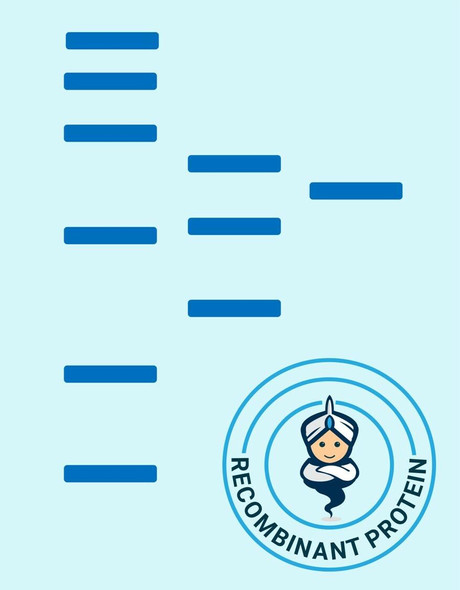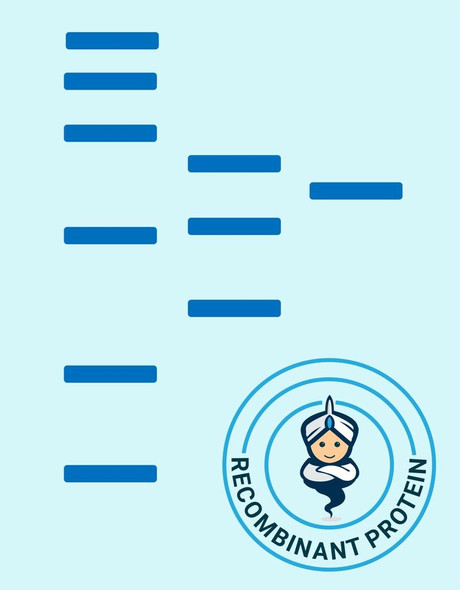Description
| Product Name: | Human PITPNA Recombinant Protein |
| Product Code: | RPPB4253 |
| Size: | 25µg |
| Species: | Human |
| Target: | PITPNA |
| Synonyms: | Phosphatidylinositol transfer protein alpha isoform, PI-TP-alpha, PtdIns transfer protein alpha, PtdInsTP alpha, PITPNA, PITPN, VIB1A, MGC99649, PI-TPalpha. |
| Source: | Escherichia Coli |
| Physical Appearance: | Sterile Filtered colorless solution. |
| Formulation: | The PITPNA solution (1 mg/ml) contains 20mM Tris-HCl buffer (pH 8.0), 1mM DTT, 10% glycerol, 1mM EDTA. |
| Stability: | Store at 4°C if entire vial will be used within 2-4 weeks. Store, frozen at -20°C for longer periods of time.�For long term storage it is recommended to add a carrier protein (0.1% HSA or BSA).Avoid multiple freeze-thaw cycles. |
| Purity: | Greater than 95.0% as determined by SDS-PAGE. |
| Amino Acid Sequence: | MGSSHHHHHH SSGLVPRGSH MVLLKEYRVI LPVSVDEYQV GQLYSVAEAS KNETGGGEGV EVLVNEPYEK DGEKGQYTHK IYHLQSKVPT FVRMLAPEGA LNIHEKAWNA YPYCRTVITN EYMKEDFLIK IETWHKPDLG TQENVHKLEP EAWKHVEAVY IDIADRSQVL SKDYKAEEDP AKFKSIKTGR GPLGPNWKQE LVNQKDCPYM CAYKLVTVKF KWWGLQNKVE NFIHKQERRL FTNFHRQLFC WLDKWVDLTM DDIRRMEEET KRQLDEMRQK DPVKGMTADD |
Phosphatidylinositol transfer protein alpha (PITPNA) is found in the cytoplasm, where it catalyzes the transfer of phosphatidylinositol (PI) and phosphatidylcholine (PC) between membranes. PITPNA belongs to a family of lipid-binding proteins which transfer molecules of phosphatidylinositol or phosphatidylcholine between membrane surfaces. PITPNA is implicated in phospholipase C signaling and in the production of phosphatidylinositol 3, 4, 5-trisphosphate (PIP3) by phosphoinositide-3-kinase.
PITPNA Human Recombinant fused with a 20 amino acid His tag at N-terminus produced in E.Coli is a single, non-glycosylated, polypeptide chain containing 290 amino acids (1-270 a.a.) and having a molecular mass of 23.9kDa. The PITPNA is purified by proprietary chromatographic techniques.
| UniProt Protein Function: | PITPNA: Catalyzes the transfer of PtdIns and phosphatidylcholine between membranes. Belongs to the PtdIns transfer protein family. PI transfer class I subfamily. |
| UniProt Protein Details: | Protein type:Lipid-binding Chromosomal Location of Human Ortholog: 17p13.3 Molecular Function:phosphatidylcholine transmembrane transporter activity; phosphatidylinositol transporter activity Biological Process: visual perception |
| NCBI Summary: | This gene encodes a member of a family of lipid-binding proteins that transfer molecules of phosphatidylinositol or phosphatidylcholine between membrane surfaces. The protein is implicated in phospholipase C signaling and in the production of phosphatidylinositol 3,4,5-trisphosphate (PIP3) by phosphoinositide-3-kinase.[provided by RefSeq, Sep 2009] |
| UniProt Code: | Q00169 |
| NCBI GenInfo Identifier: | 130770 |
| NCBI Gene ID: | 5306 |
| NCBI Accession: | Q00169.2 |
| UniProt Secondary Accession: | Q00169,P16446, P48738, P53810, Q2HJ54, |
| UniProt Related Accession: | Q00169 |
| Molecular Weight: | 31,806 Da |
| NCBI Full Name: | Phosphatidylinositol transfer protein alpha isoform |
| NCBI Synonym Full Names: | phosphatidylinositol transfer protein alpha |
| NCBI Official Symbol: | PITPNA�� |
| NCBI Official Synonym Symbols: | PITPN; VIB1A; HEL-S-36; PI-TPalpha�� |
| NCBI Protein Information: | phosphatidylinositol transfer protein alpha isoform |
| UniProt Protein Name: | Phosphatidylinositol transfer protein alpha isoform |
| Protein Family: | Phosphatidylinositol transfer protein |
| UniProt Gene Name: | PITPNA�� |
| UniProt Entry Name: | PIPNA_HUMAN |






